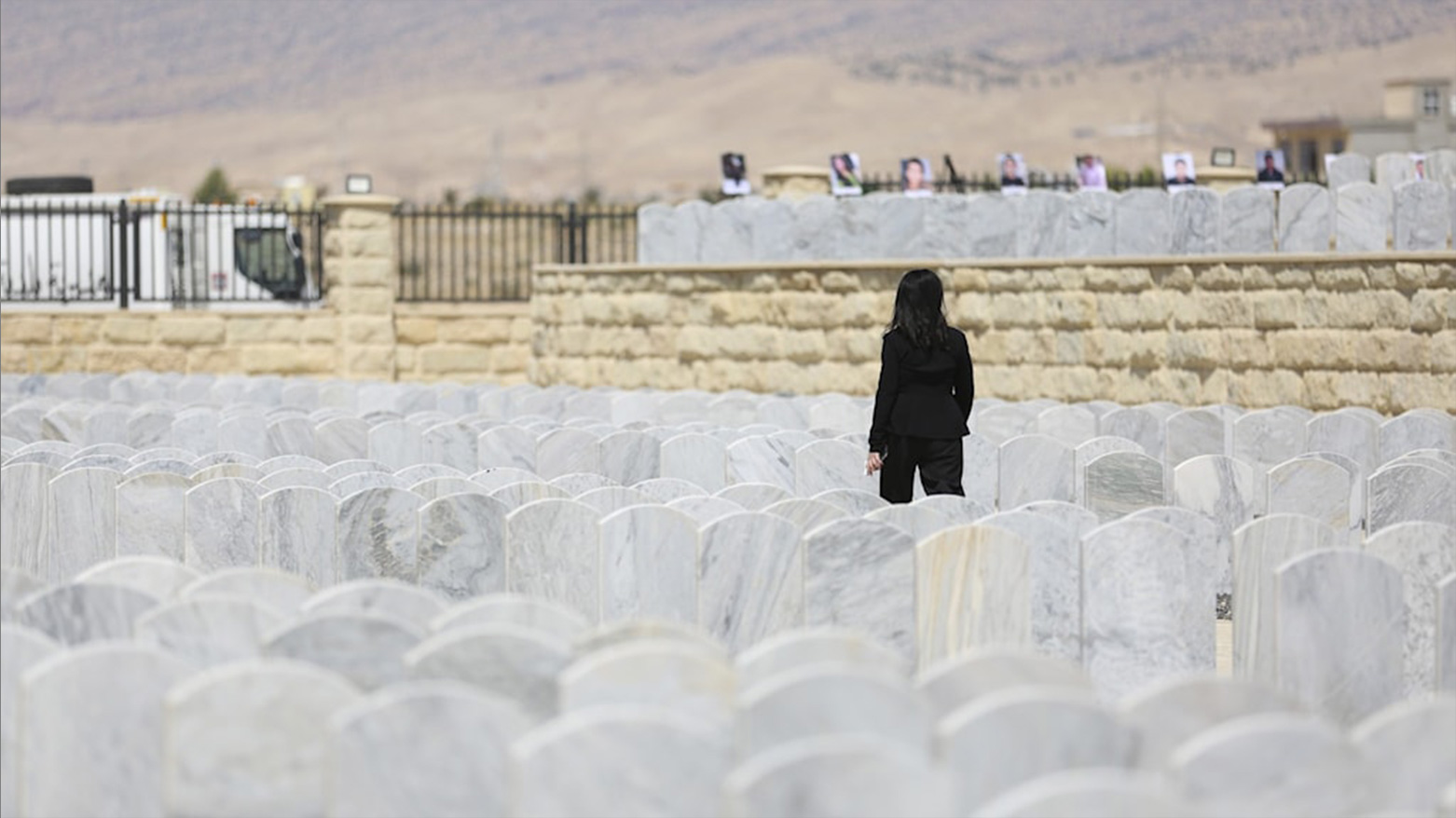“The Genocide Seems to Have No End”: Yazidis Mourn, Seek Justice
The passage of Iraq’s General Amnesty Bill has raised fears among Yazidis that it could lead to the release of individuals implicated in mass killings and crimes against their community.

ERBIL (Kurdistan24) – The scars of the Yazidi genocide were reopened on Friday as the remains of 32 Yazidi victims murdered by ISIS were returned to their families in a somber ceremony in Sinjar.
The long and painful process of identifying and repatriating the remains of those massacred continues, highlighting ongoing grievances over the lack of justice and support for the Yazidi community.
A Decade of Unanswered Grief
Among the mourners was Ikhlas, a survivor of ISIS captivity who received the remains of her two brothers and father.
Overwhelmed with sorrow, she told Kurdistan24, “The genocide against Yazidis seems to have no end, and it won’t end. We still don’t know when the other mass graves will be excavated so that we can find some closure in knowing the fate of our loved ones.”
For over ten years, Yazidi families have endured the agony of waiting for news about their missing relatives.
Despite some progress in identifying remains through DNA testing, bureaucratic delays and a lack of resources have slowed the process significantly.
The return of remains on Friday marks the seventh round of repatriation efforts, bringing the total number of recovered victims to 275, while more than 300 bodies remain in Baghdad awaiting identification.
Challenges in Identifying Mass Grave Victims
The excavation of mass graves has been ongoing for the past three years, but only a fraction of the victims’ identities have been confirmed. Dr. Yasamin Munzer, head of the Mass Graves Department, cited several challenges: “The testing process is difficult due to the limited number of testing units. Many families were killed in Sinjar, leaving no relatives to compare DNA with. Additionally, some of the victims’ families are abroad, and we have collected DNA samples from them through our teams in Germany. After Ramadan, we plan to conduct another round of tests in Germany.”
Currently, 93 mass graves have been identified, with 55 excavated and 38 still untouched. Of the 750 bodies exhumed, 508 remain unidentified, while 242 have been confirmed and returned to their families.
The Struggle for Recognition and Justice
Many Yazidis argue that the Iraqi government has been slow to prioritize mass grave excavations and justice for victims. Mahma Khalil, a Yazidi member of the Iraqi Parliament from Duhok, told Kurdistan24: “As Yazidis are once again reminded of their suffering and the ongoing threat of genocide, we acknowledge that there are even more mass graves than those officially confirmed. We continuously urge the Iraqi government to hold criminals accountable under the law and constitution. Additionally, we have repeatedly called on the government and relevant authorities to speed up the excavation of these mass graves.”
When asked about the delays, Khalil identified four key obstacles:
1- Negligence by the Iraqi government and lack of attention to the issue.
2- Insufficient equipment and resources to conduct proper excavations.
3- Lack of international pressure on Baghdad to accelerate efforts.
4- The dispersion of Yazidi families across the world, making DNA identification more complex.
Despite these hurdles, Yazidi leaders insist that these challenges can and must be overcome to ensure justice for the victims.
Concerns Over the General Amnesty Bill
The passage of Iraq’s General Amnesty Bill has raised fears among Yazidis that it could lead to the release of individuals implicated in mass killings and crimes against their community.
Khalil stressed the importance of excluding ISIS members and their supporters from any form of amnesty: “It is the right of Yazidis and all Iraqis to reject this bill, as it could allow barbaric ISIS criminals, their families, and those who supported them to be released.”
However, he noted that the Federal Supreme Court has reassured Yazidi leaders that genocide perpetrators will not be included under the law.
Lingering Threats and an Uncertain Future
While the remains of Yazidi victims continue to arrive in small numbers, the Iraqi government has been swift in repatriating ISIS prisoners from al-Hol camp to Jadaa camp, raising security concerns. “These ISIS prisoners are ticking time bombs that threaten the security of Iraq and beyond,” Khalil warned.
For Yazidis, closure remains elusive.
As mass graves continue to be uncovered, the grief of families is compounded by the lack of accountability and clear legal recognition of the crimes committed against them.
Many demand not only expedited excavation efforts but also a formal acknowledgment of the Yazidi genocide and concrete steps toward rebuilding Sinjar.
Until then, the Yazidis of Sinjar remain trapped between the past and an uncertain future, still searching for justice, closure, and the long-overdue return of their loved ones.